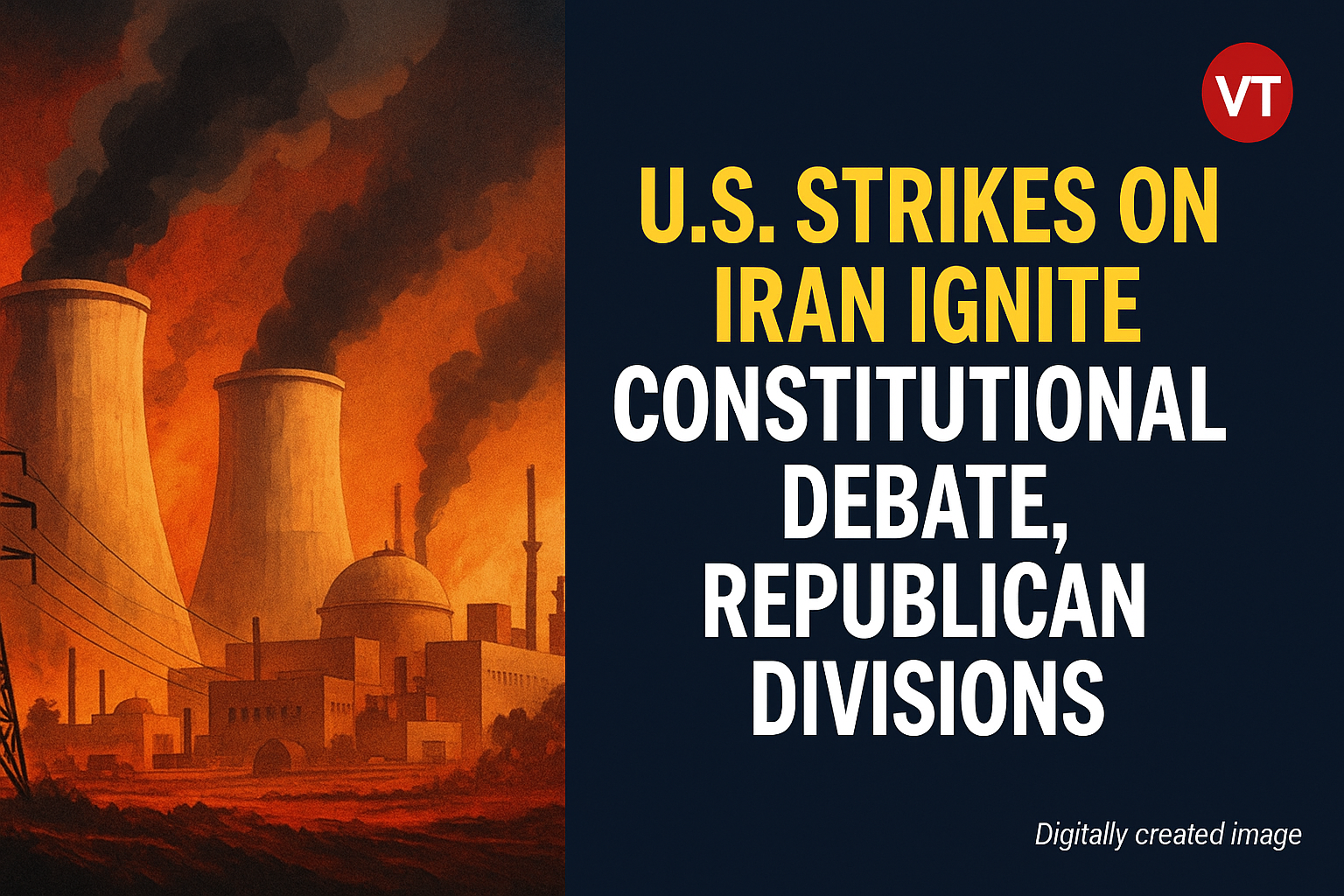President Donald Trump’s unilateral decision to launch military strikes on three Iranian nuclear facilities has sparked a fierce constitutional debate and revealed deep fractures within the Republican Party. The strikes, targeting uranium enrichment facilities in Fordow, Natanz, and Isfahan, were executed Saturday night without prior congressional approval.
What happened:
In a televised address, Trump said the operation had “completely and totally obliterated” Iran’s nuclear capabilities. “Our objective was the destruction of Iran’s nuclear enrichment capacity and a stop to the nuclear threat posed by the world’s number one state sponsor of terror,” he declared, flanked by Vice President JD Vance, Secretary of Defense Pete Hegseth, and Secretary of State Marco Rubio.
Why it matters:
According to the Pentagon, B-2 stealth bombers and U.S. Navy submarines carried out the strikes with “precision and proportionality.” The International Atomic Energy Agency (IAEA) confirmed no off-site radiation leaks. Defense officials estimate the operation will delay Iran’s nuclear program by at least five years but caution Iran may retaliate via asymmetric means, including strikes on U.S. bases or maritime disruptions in the Strait of Hormuz.
Constitutional backlash:
The legality of the action is under fire. Lawmakers from both parties argue the strikes bypass Article I, Section 8 of the Constitution — which vests war-declaring powers in Congress — and violate the War Powers Resolution of 1973. Rep. Alexandria Ocasio-Cortez (D-N.Y.) called the move “grounds for impeachment,” stating on X: “The President’s disastrous decision to bomb Iran without authorization is a grave violation of the Constitution and Congressional War Powers.”
Republican rift:
Rep. Marjorie Taylor Greene (R-Ga.) emerged as a vocal internal critic, accusing the administration of recklessness and unconstitutionality. In a fiery X post, Greene wrote:
Greene warned of possible retaliation on U.S. soil and condemned what she described as a strike conducted “on behalf of another foreign country,” referencing Israel’s prior attacks. She urged Americans to “pray we are not attacked by terrorists at home.”
While Greene’s stance has gained support from isolationist Republicans, she faces pushback from GOP leaders. House Speaker Mike Johnson (R-La.) backed the action, saying, “President Trump made the right call in the face of imminent danger.” Senate Majority Leader John Thune (R-S.D.) called Iran’s nuclear ambitions a “red line” supported by intelligence.
GOP hawks defend Trump:
Sen. Lindsey Graham (R-S.C.) dismissed Greene’s criticism during a Fox News appearance:
Other Republicans, including Sens. Ted Cruz (R-Texas) and Tom Cotton (R-Ark.), echoed that view. Cotton cited Defense Secretary Hegseth’s Senate testimony confirming Iran was “actively working towards a nuclear weapon.”
International reaction:
Iranian Foreign Minister Abbas Araghchi denounced the strikes as a “blatant violation of international law.” Iran’s Atomic Energy Organization reported minimal infrastructure loss due to early evacuations but warned of future countermeasures.
This action has escalated tensions in the Middle East, drawing criticism from global leaders. U.N. Secretary-General António Guterres described the strikes as a “dangerous escalation,” adding:
There is a growing risk that this conflict could rapidly get out of control – with catastrophic consequences for civilians, the region, and the world.
I call on Member States to de-escalate and to uphold their obligations under the @UN Charter and other rules of international law.
At this perilous hour, it is critical to avoid a spiral of chaos.”
U.K. Prime Minister Keir Starmer also weighed in, writing on X:
The situation in the Middle East remains volatile and stability in the region is a priority. We call on Iran to return to the negotiating table and reach a diplomatic solution to end this crisis.”
Pakistan issued a formal statement condemning the U.S. airstrikes as a violation of international law and a destabilizing move in an already volatile region.
Congress pushes for war powers oversight:
Rep. Thomas Massie (R-Ky.) and Rep. Ro Khanna (D-Calif.) have introduced a bipartisan War Powers Resolution requiring Congressional approval for further actions in Iran. “This is not constitutional,” Massie said. Sen. Tim Kaine (D-Va.) added that Israeli actions had already weakened Iran’s program, questioning the need for U.S. strikes.
What’s next:
Public opinion is split. According to a Washington Post poll, 45% of Americans oppose launching U.S. airstrikes on Iran, while only 25% support it, with the remainder undecided. As Iran considers its response and Congress debates legal ramifications, the episode has become a flashpoint in the broader struggle over war powers and the future of U.S. foreign policy in the Middle East.
A global media for the latest news, entertainment, music fashion, and more.














